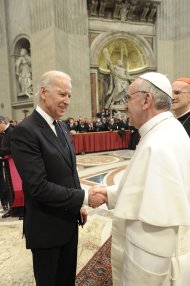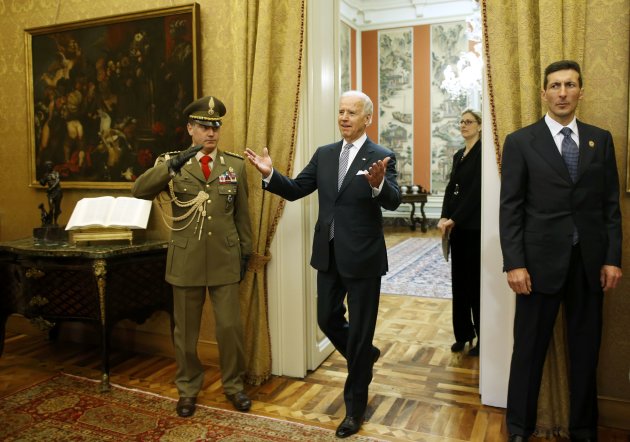
But one thing Biden did during his whirlwind visit to Rome?not even 48 hours on the ground?was highlight American prestige and the symbolism of U.S. global leadership, crucial but hard-to-measure sources of ?soft power? influence in world affairs.
Sure, there were a couple of what the media has come to describe as ?Biden being Biden? moments (a label his communications staff has tried to appropriate). At a time when partisan Washington feuds over painful spending cuts known as sequestration, Biden joked that sequestered Cardinals who speedily picked a new pope had proven more decisive than, say, partisan Washington.
?I didn?t realize you?d arrange for a new pope so quickly,? Biden said to Italian President Giorgio Napolitano as they met in the Quirinale Palace.
"They are quicker than Italian politics," Napolitano replied in English.
"They're quicker than American politics," the vice president said with a grin.
And he quipped that he had to attend an evening reception with American cardinals ?or I?ll lose my soul." (Oh, for pete?s sake, it was a joke, though perhaps one given an edge by the aforementioned tensions between Church and State.)
So what did Biden bring to Europe, apart from a fleet of black vehicles with ?Taxation Without Representation? license plates, a small army of Secret Service agents, a phalanx of staff, and a letter from Obama to the new pope (contents unknown)?
First, prestige. Lyndon Johnson may have disparaged the vice presidency as worth roughly a "bucket of warm [censored]," but news stories about Pope Francis?s installation mass invariably mentioned Biden among the guests who had come to (figuratively?) kiss the ring. Yes, it goes both ways?Biden?s presence affirmed the Vatican?s power in world affairs (and domestic U.S. politics) even as it showcased the importance of American support for the venerable institution.
Second?let?s call it ?relations maintenance.? We won?t know for months, if ever, what impact Biden?s conversations with Italy?s president and outgoing prime minister about the state of European financial affairs will have.
But Italy is an important ally. (Do you care about the Sept. 11 2012 attack on the American compound in Benghazi? Then you care about U.S.-Italian relations. Italy maintains a potent intelligence presence in North Africa, and notably in Libya, a former colony.) And with Europe struggling to climb out of its financial crisis, Italy?s troubled economy worries officials in Washington?especially when coupled with its political dysfunction (though Italians might say the same about the American economy).
And the Vatican has traditionally played an important role in world affairs.
Perhaps only foreign policy nerds (guilty!) will note that Kosovo Prime Minister Hashim Thaci?s meeting with Biden on Monday was unveiled at the last minute, after the announcement that the vice president would meet with Serbian President Tomislav Nikolic. (Kosovo won its independence from Serbia thanks in large part to NATO military help.)
As for that meeting with Nikolic? Biden?s office said the vice president highlighted ?our desire for a deeper partnership in the years ahead??but also better relations with Kosovo.
?The vice president continues to encourage both Serbia and Kosovo to take the steps necessary to normalize relations to advance their European integration and to ensure a more secure and prosperous future for the people of both countries,? Biden?s office said.
The vice president also met with Polish President Bronislaw Komorowski, notably thanking Warsaw for ?its agreement to host planned Missile Defense assets.? (Yup, ?Missile Defense? capitalized in the statement from Biden?s office.)
Biden?s office didn?t say it, but the meetings with leaders of Serbia and Poland came at a time when Washington is worriedly watching relations with Russia.
The only controversy in Rome may come from the fact that Biden and House Democratic Minority Leader Nancy Pelosi, both Catholics who have defended access to abortion, took Communion. Conservative Catholics have condemned that in the past.
What will come of Biden?s trip? Maybe a few photos from Pope Francis? installation mass, and the official receiving line. Maybe a couple of allies reassured about the degree to which Washington values them. Maybe a better sense of just how bad things might get in Europe before they get better. Maybe a little push to Serbia and Kosovo to make nice. A reaffirmation that the United States still dominates world affairs despite China?s assertive rise. Nothing dramatic, though, at least in the short term. Just the grind of American diplomacy.
Just Biden being Biden.